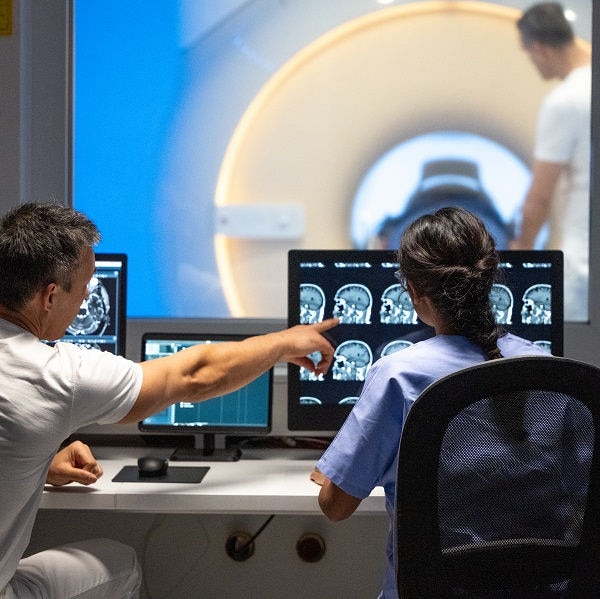News
January 10, 2025
Insights from a surgeon: How can omega-3s elevate perioperative nutrition?
Discover insights from a Critical Care Surgeon on the benefits of omega-3 nutrition in perioperative care.

- Perioperative care aims to reduce the risks associated with surgery, improve surgical outcomes, and promote faster recovery – with nutritional intervention playing an important role in this approach.
- In a recent presentation, Dr. Martin Rosenthal—a Critical Care Surgeon based in Florida—emphasized the powerful potential of omega-3 fatty acids in supporting patient health during and after surgery, advocating for the inclusion of omega-3s in medical nutrition strategies developed for perioperative optimization.
- We had the opportunity to sit down with Dr. Rosenthal to delve into his expertise in this field and gain a better understanding of how omega-3s could elevate perioperative nutrition to support treatment outcomes.
For some patients, surgery is the only option. Major operations require patients to be as strong, healthy, and resilient as possible. This is where perioperative care can play a vital role. This approach refers to the holistic care a person receives before, during, and after surgery, with the goal of promoting a smooth surgical experience, minimizing complications, and speeding up recovery. Perioperative care encompasses various strategies, including nutritional interventions, pain management, physical therapy, and infection control, among others.
Nutrition is a key element in this care model, because it is a major determinant of surgery outcomes, with malnutrition and underfeeding being risk factors for postoperative complications. Nutritional intervention may involve oral feeding (in the form of oral nutritional supplements, or ONS) as soon as possible post-surgery, early enteral (tube) feeding when the oral route is not permissible, or even intravenous (IV) intervention, to reduce the risk of poor clinical outcomes associated with malnutrition.
During an expert-led webinar at the American Society for Parenteral and Enteral Nutrition (ASPEN) conference, Critical Care Surgeon, Dr. Martin Rosenthal, explored the benefits of omega-3 fatty acids for perioperative care. To support medical nutrition brands looking to innovate in this area, we interviewed Dr. Rosenthal about his understanding of the role of omega-3s in the health of patients going through surgery, and about the scientific evidence behind the benefits of these vital nutrients.
Dr Martin Rosenthal, MD, FACS, is a Critical Care Surgeon and Associate Professor of Surgery at the University of Florida Division of Acute Care Surgery. To gain deeper insights into the potential of omega-3s in perioperative care, click here watch his presentation held at the ASPEN Conference 2024.

1. Can you explain the key benefits of omega-3 fatty acids for surgical patients, both pre- and post-operatively?
In my view, incorporating omega-3s into perioperative care is essential, especially considering that the majority of the global population is already deficient in these vital fatty acids.1,2 The primary benefits of omega-3s for surgical patients include (1) nutritional support, (2) improved cell membrane function, and (3) immunomodulation of the inflammatory response.
What I mean by nutritional support is that omega-3 fatty acids are a key macronutrient (type of fat) that bring multiple health benefits—including heart, brain and immune health support. Omega-3s are energy-dense too, meaning they provide a significant amount of energy (calories), which is important for individuals needing extra nutritional support, like patients recovering from surgery. In addition to providing general nutritional support, omega-3s help to enhance cell function by strengthening the lipid raft integrity (otherwise known as the cell membrane). This allows for more effective communication between cells—which is critical during surgery and recovery, because communication helps to coordinate the body’s immune and healing processes.
Perhaps one of the most important benefits of omega-3s during surgery though, is their ability to help regulate the body’s inflammatory response, known as immunomodulation. Research shows that consuming omega-3s 7-10 days prior to surgery, and continuing post-operatively, can significantly reduce inflammation markers, like C-reactive protein (CRP) and Interleukin-6 (IL-6).3 The reduction of these inflammatory markers has been linked to better clinical outcomes, including reduced septic complications and shorter hospital stays. Furthermore, evidence highlights the role of omega-3s in producing specialized pro-resolving mediators (SPMs), which actively aid in resolving harmful inflammation.4,5,6 Limiting chronic inflammation could be particularly beneficial in cases of major surgeries involving burns, trauma, or sepsis.
2. You mention that omega-3s can minimize the inflammatory response—are there other conditions or circumstances where this response is presented?
There are several conditions where modulating inflammation offers significant benefits—but this is especially true for infectious and autoimmune conditions where inflammation is very present and has a major negative impact. In my own research, we’ve speculated that omega-3 fatty acids and their derivatives, SPMs, could benefit patients with persistent inflammation, immunosuppression, and catabolic syndrome (PICS) specifically.7
PICS is a complex condition that often occurs in critically ill patients, like those surviving severe infections, trauma, or prolonged stays in intensive care units (ICUs). A hallmark of PICS is ongoing, low-grade inflammation that continues even after the acute illness or injury has resolved which can cause catabolism, a condition where the body breaks down muscle for energy. Once this cycle of inflammation and muscle loss begins, it is very difficult to stop. In fact, research conducted by Zudin Puthucheary reveals that patients can lose up to 17% of skeletal muscle mass per day due to this catabolic state—illustrating the significant damage this process can cause.8 Minimizing this excessive inflammation with omega-3 or SPM nutrition could therefore offer substantial benefits for these patients.
3. Some oral nutritional supplements (ONS) and tube-feeds (TF) include omega-3s. Would you say this is an advantage to all patients or only certain patient groups?
Evidence from ASPEN and the Society of Critical Care Medicine (SCCM) supports omega-3 intervention in surgical patients and those with traumatic brain injury more openly. However, I believe that omega-3 nutrition should not be limited to these patients alone—especially considering most people worldwide aren’t getting enough of these vital fatty acids as mentioned above. An analysis by Jesmond Dalli found that critically ill patients experienced reduced inflammation as a result of omega-3s and SPMs; further underscoring that a broad range of patients could benefit from these essential nutrients.9
4. Are there any promising areas of research or innovations relating to omega-3s in clinical applications that you could tell us about?
For me, one of the most exciting areas for innovation is the development of more sustainable omega-3 solutions—like those derived from algae. This approach could lead to reduced environmental impact, improved ocean health, and ultimately more long-term and cost-effective solutions for medical nutrition advancements. Additionally, ongoing clinical research exploring the benefits of algal-origin omega-3 oils and SPMs would help to build on promising data from preclinical trials and further unveil the potential of plant-based omega-3s for human health.
Want to learn more about the potential of omega-3s for perioperative nutrition?
Watch Dr. Rosenthal’s insightful presentation from ASPEN.
References
1. Dempsey, Meghan, Michelle S. Rockwell, and Laurel M. Wentz. "The Influence of Dietary and Supplemental Omega-3 Fatty Acids on the Omega-3 Index: A Scoping Review." Frontiers in Nutrition 10 (2023): 1072653.
2. Stark, Ken D., Mary E. Van Elswyk, M. Roberta Higgins, Charli A. Weatherford, and Norman Salem Jr. "Global Survey of the Omega-3 Fatty Acids, Docosahexaenoic Acid and Eicosapentaenoic Acid in the Blood Stream of Healthy Adults." Progress in Lipid Research 63 (2016): 132-152.
3. Pradelli, Lorenzo, Konstantin Mayer, Stanislaw Klek, et al. "ω-3 Fatty-Acid Enriched Parenteral Nutrition in Hospitalized Patients: Systematic Review With Meta-Analysis and Trial Sequential Analysis." JPEN Journal of Parenteral and Enteral Nutrition 44, no. 1 (2020): 44–57.
4. Serhan, Charles. "Resolution Phase Lipid Mediators of Inflammation: Agonists of Resolution." Current Opinion in Pharmacology 13 (2013): 632–640.
5. Hasturk, H, Kantarci, A, Ohira, T, et al. "RvE1 Protects from Local Inflammation and Osteoclast Mediated Bone Destruction in Periodontitis." FASEB Journal 20 (2006): 401–403.
6. Hasturk, Hatice, Alpdogan, Kantarci, Emilie, Goguet-Surmenian, et al. "Resolvin E1 Regulates Inflammation at the Cellular and Tissue Level and Restores Tissue Homeostasis In Vivo." Journal of Immunology 179 (2007): 7021–7029.
7. Rosenthal, Martin D., Trina Bala, Zhongkai Wang, Tyler Loftus, and Frederick Moore. "Chronic Critical Illness Patients Fail to Respond to Current Evidence-Based Intensive Care Nutrition Secondarily to Persistent Inflammation, Immunosuppression, and Catabolic Syndrome." JPEN Journal of Parenteral and Enteral Nutrition 44, no. 7 (September 2020): 1237–1249.
8. Puthucheary, Zudin, Jaikitry Rawal, Mark McPhail, et al. "Acute Skeletal Muscle Wasting in Critical Illness." JAMA 310, no. 15 (October 16, 2013): 1591–1600.
9. Dalli, Jesmond, Colas, Romain, Quintana, Carolina, et al. “Human Sepsis Eicosanoid and Proresolving Lipid Mediator Temporal Profiles: Correlations with Survival and Clinical Outcomes.” Crit Care Med 45, no. 1 (2017): 58-68.
Related Content
Quick links
Customized blends of functional ingredients in one single, efficient premix.
Streamline your product development process and get to market faster.
From trade shows to conferences and other industry events, find out where you can meet us next.
Talking Nutrition, Health & Care
Explore new science, consumer insights, industry news and more in our latest articles.
Discover educational whitepapers, webinars, publications and technical information.
Request samples, place orders and view product documentation.


